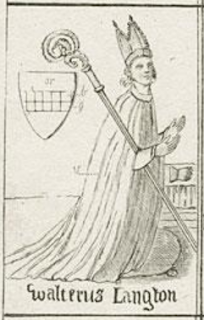When Edward I died a little over a year later, in July 1307, Winchelsey was able to return to England upon the request of Edward's son and successor, Edward II. (The illustration is of Edward II's coronation.) The pope was okay with the new king wanting the old archbishop back. While everyone was willing to placate the new king, however, Winchelsey (along with one other: the 10th Earl of Warwick Guy de Beauchamp) was opposed to the return of Edward's favorite exiled companion, Piers Gaveston. (Beauchamp would ultimately be involved in Gaveston's end.)
When the barons had had enough of Edward's excesses, Winchelsey sided with them by excommunicating their enemies.
Besides his political troubles, Winchelsey was actually considered a good preacher. While a canon at St. Paul's in London, his sermons and lectures attracted large crowds. Several of his writings from his time at St. Paul's survive. They are recordings of public debates or lectures that intended to answer questions presented by the audience. This practice started at the University of Paris when theological faculty would suspend classes just before Christmas and Easter and hold public sessions that anyone could attend and ask questions. These were called quodlibeta (Latin: "whatever you like"). Recorded quodlibeta survive from many of the men mentioned in this blog,
After his death on 11 May 1313, it was said that miracles took place at his tomb. Attempts to canonize him went nowhere, however.
The 10th Earl of Warwick, Guy de Beauchamp, is usually mentioned in a historical context as the enemy of Edward II and Piers Gaveston. He was more complex than that, however, known for an extensive library—not usual for a knight—and was highly respected by kings and fellow nobles. I'll talk about him more next time.



